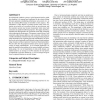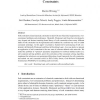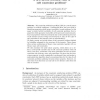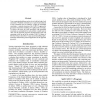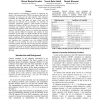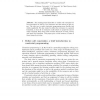131
click to vote
ICCAD
2009
IEEE
14 years 11 months ago
2009
IEEE
In a behavioral synthesis system, a typical approach used to guide the scheduler is to impose hard constraints on the relative timing between operations considering performance, a...
129
click to vote
SAC
2002
ACM
15 years 1 months ago
2002
ACM
Soft constraints are a generalization of classical constraints, where constraints and/or partial assignments are associated to preference or importance levels, and constraints are...
113
click to vote
CI
2004
15 years 1 months ago
2004
Soft constraints are a generalization of classical constraints, which allow for the description of preferences rather than strict requirements. In soft constraints, constraints and...
118
click to vote
ENTCS
2007
15 years 2 months ago
2007
Soft constraints extend classical constraints to deal with non-functional requirements, overconstrained problems and preferences. Bistarelli, Montanari and Rossi have developed a ...
110
click to vote
CORR
2010
Springer
15 years 2 months ago
2010
Springer
The constraint satisfaction problem (CSP) is a central generic problem in artificial intelligence. Considerable effort has been made in identifying properties which ensure tractabi...
129
click to vote
FLAIRS
2003
15 years 3 months ago
2003
Over-constrained problems can be solved with the help of soft constraints. Weighted constraints are a typical representation of soft constraints used to minimize weights of unsati...
128
click to vote
AIPS
2006
15 years 3 months ago
2006
Recent research in AI Planning is focused on improving the quality of the generated plans. PDDL3 incorporates hard and soft constraints on goals and the plan trajectory. Plan traj...
109
click to vote
BIRTHDAY
2008
Springer
15 years 4 months ago
2008
Springer
The semiring-based formalism to model soft constraint has been introduced in 1995 by Ugo Montanari and the authors of this paper. The idea was to make constraint programming more f...
107
click to vote
CSCLP
2007
Springer
15 years 8 months ago
2007
Springer
The notion of optimality naturally arises in many areas of applied mathematics and computer science concerned with decision making. Here we consider this notion in the context of ...
